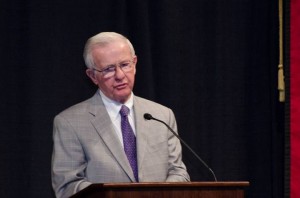Fear is the Cause of War
 Bishop Joe E. Pennel, Jr, Professor of the Practice of Leadership, writes about his concern for the chaos in today’s world and his attempt to understand the source as informed by the faith that gave birth to the Church.
Bishop Joe E. Pennel, Jr, Professor of the Practice of Leadership, writes about his concern for the chaos in today’s world and his attempt to understand the source as informed by the faith that gave birth to the Church.
Fear is a sign of our time in history. Fear captures the hearts of people from every smooth and hilly part of the world. It is so powerful that it can keep us from seeing the flowers in the ditch.
Fear is a signal that there is a great and wide gulf between the spirit of love and the signs of our times. It is a natural reaction to an objective identifiable danger which may involve either flight or attack in self-defense. When fear grips us, we either fight back or take flight.
In 1963 Dr. Langdon Gilkey, one of my professors at Vanderbilt Divinity School, took a group of students to visit the Monastery of Gethsemane to have a conversation with Thomas Merton. Gethsemane is located in Kentucky.
I, as a young Methodist seminarian, had never been inside a Roman Catholic monastery. It was an experience like no other. On that visit, I was introduced to the importance of nurturing the inner life. Father Merton spoke about the importance of a sincere faith being of both the head and the heart. As we sat in a circle on the floor one of the students asked, “Father Merton, what is the cause of war?” Father Merton prayerfully replied, “Fear is the cause of war.”
The contemporary presence of fear points beyond itself to the mess in which we find ourselves. On the one hand we are capable of hating and hurting. Confuse us, and we lash out. Crowd us, and we kill and destroy. Deprive us, and we retaliate. Threaten us, and we bomb and burn. Enslave us, and we revolt. If we are not loved, we never learn to love.
On the other hand, the human family is also equipped for loving and healing. Our bite can be sweet; our hands can offer a healing touch; our feet can take us to those in need, and our talents can create that which is both useful and beautiful. Our minds can ponder what it would take for all of God’s siblings to experience the comfort and joy of peace.
Society is also a great composite picture of our ability to do something good. Art, culture, philosophy, order, writing, and religion have all been used to tame the tiger within us. These are expressions of the common good, and we cannot have too much of this. The highest teachings of every major religion give instruction about the importance of working for the good of all people—no matter whom they are or where they live.
Every religion speaks about the way of peace. The essential teaching of every religion says, without reserve, that love overcomes fear. This does not mean a one-sided love where we love only those who belong to our nation, our race, our religion, our rituals, or our reference group. Love is the way to peace.
The Bible is clear about this. It says, “there is no fear in love, but perfect love casts out fear, for fear has to do with punishment, and whoever fears has not reached perfection in love” (I John 4:18) Some would say this is too idealistic and out of touch with the issues of our day. I would say this is God’s dream for the world. God’s dream is that every individual, every tribe, every nation, every religion will express love and mutual respect for one other.
It is sad that we have lived on this earth for all of these years and have not learned how to love each other. Fear will continue to manifest itself until we learn that there is another way.
Joe E. Pennel Jr.
Bishop of the United Methodist Church (retired)
Professor for Leadership—Vanderbilt Divinity School
(joe.e.pennel @vanderbilt. edu)